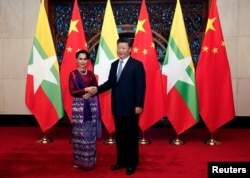Intensified fighting between ethnic rebel groups and government forces in northern Myanmar has forced several thousand to flee into China’s southern province of Yunnan, raising concerns in Beijing about border security.
The clashes and reports of stray munitions flying into Chinese territory have stirred up a debate online, with some calling on authorities in China to do more to help resolve the conflict and aid efforts in Myanmar to forge reconciliation.
Given China’s economic interests in conflict areas near the border, there are limits to what can be done, analysts said, but also signs as well that Beijing may be looking for a new approach.
Securing the border
In response to the violence, China has already put its military on high alert and called for an immediate halt to military action to ensure that stability returns to the border as soon as possible. It has also said it is willing to play a constructive role in Myanmar’s peace process and efforts by the new administration to resolve decades of conflict with ethnic minority groups.
China is traditionally reticent to become publicly involved in foreign nations' internal issues, but top Chinese officials have voiced support for peace talks. Earlier this year, when Myanmar’s State Counsellor Aung San Suu Kyi visited Beijing, President Xi Jinping voiced his support of the reconciliation effort. China also sent an envoy to encourage two groups to attend peace talks which were held in late August.
Another round of talks is scheduled for February, but the renewed fighting, which has seen three ethnic armed organizations join forces with the Kachin Independence Army, is dimming hopes that groups will be able to agree to a ceasefire before the next round of talks.
Myanmar is holding peace talks every six months and aims to achieve complete peace across the country by 2020, if not earlier.
Aung San Suu Kyi rose to power on promises of national reconciliation, but the clashes along the Myanmar – China border and conflicts in northwestern Rhakine state that have sent hundreds of Rohingya Muslims fleeing into neighboring Bangledesh, have raised questions about the prospects of the effort.
What some in China are looking for is a more assertive approach from Beijing.
In an article in the Communist-party backed Global Times newspaper this week, Yunnan University political science professor Bi Shihong argued that more efforts are needed.
“China can take stronger measures of creative involvement to intensify coordination and mediation, and urge the military, the government and ethnic armed groups to go back to the negotiating table,” Bi said.
What form China's involvement will take remains unclear. In some online forums, internet users have suggested measures such as working to help ethnic groups gain more autonomy or selling the Myanmar military hardware including fighter jets.
Independence to Autonomy
Analysts note that while it is clearly in China’s interests to maintain stability at its border and support efforts by the new administration to promote reconciliation, Beijing is in a difficult and delicate position, said Chao Chung-chi, an assistant professor of Southeast Asian Studies at National Chinan University.
“From China’s point of view, actively engaging and helping facilitate (the peace process), can help to secure the border,” Chao said. “At the same time, everyone knows that areas controlled by ethnic minorities are rich in natural resources and if China is actively engaged that can help its ability to continue investing there as well.”
Overplaying its hand or doing more to help one side or the other – be it the Myanmar military or ethnic group has its risks.
Some of the ethnic groups that are at odds with the Myanmar government have populations on both sides of the China Myanmar border. The demands of ethnic groups range widely with some striving for independence and others increased autonomy.
For groups such as the Kachin Independence Organization, whose armed wing the Kachin Independence Army is involved in the current round of fighting, agreeing to a peace settlement is tantamount to surrendering.
New interests
For a long time, the buffer zone of autonomous and ethnic regions along the border between Myanmar and China have benefited Chinese commercial interests. Ethnic armed organizations have helped protect the flow of illegal trade of jade and timber through a network of unaccounted stakeholders.
But that is changing, even as tensions continue. Myanmar’s shift toward democracy and emerging environmental laws are make it tougher for Chinese companies to operate. The increased involvement of civil society groups is an emerging obstacle as well.
And China, which is still Myanmar’s biggest trading partner, is seeing its influence erode as involvement in the economy by Japan and the United States grows.
Angshuman Choudhury, a researcher at the Institute of Peace and Conflict Studies in New Delhi said that with these changing realities, Beijing appears to be looking for a whole new approach to boost its commercial links with Myanmar beyond its illegal trade.
“Beijing has higher economic stakes in Myanmar, in the form of massive hydro-power projects (the construction for many are about to start), oil/gas pipelines, road connectivity projects, and perhaps, a legal jade and timber trade,” Choudhury said.
Unlike its competitors, Choudhury adds, China's position of negotiator in the internal peace process of Myanmar automatically gives it a significant role in the country's internal dynamics, enhancing Beijing's position in future bilateral negotiations.






